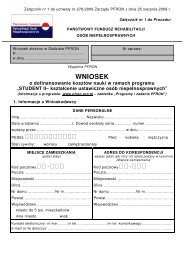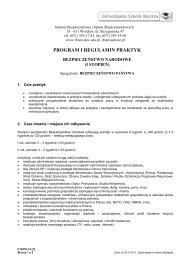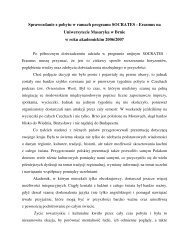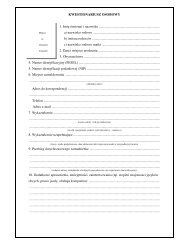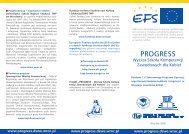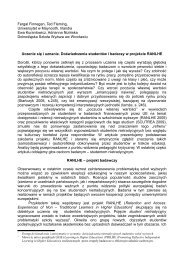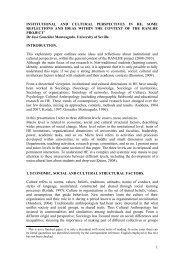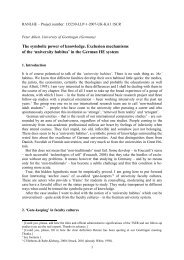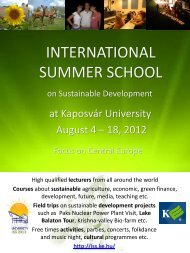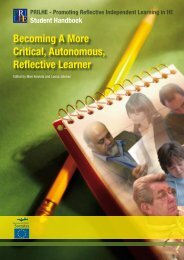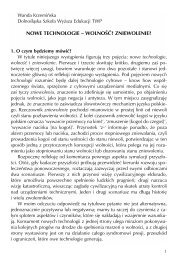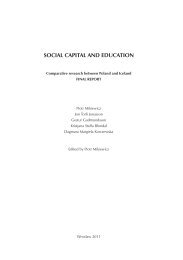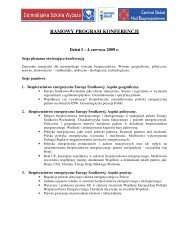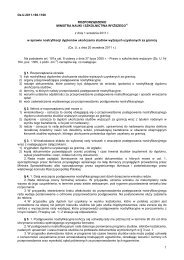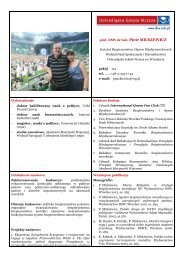Becoming A More Critical, Autonomous, Reflective Learner
Becoming A More Critical, Autonomous, Reflective Learner
Becoming A More Critical, Autonomous, Reflective Learner
Create successful ePaper yourself
Turn your PDF publications into a flip-book with our unique Google optimized e-Paper software.
PRILHE Project - Lecturer’s Toolkit<br />
<strong>More</strong> formally organised Peer Support and Review<br />
Peer support, and the critical reflection it promotes, can also be more formally organised.<br />
A UK example<br />
At the University of Sussex, in the Foundation Degree in Community Development, students are formed into Action Learning<br />
Sets. Action Learning Sets are designed to help students reflect collaboratively in small groups on their current work<br />
situations and how this relates to, has been influenced by and can be further affected by the on-going work of the<br />
programme. The Action Learning Sets may need to be set up by tutors with ground rules etc but soon can be largely selfprogramming.<br />
Students bring own working problems to the action learning set and discuss them in confidence and in relation<br />
to the common understandings and language of the course and the approach to reflective practice they have developed<br />
throughout the programme.<br />
A German example<br />
<strong>More</strong> formalised peer support and review can be particularly useful in professional learning situations:<br />
We demand of the students that they accompany their practical experiences with supervision. And we’re organising it<br />
by having the students of the postgraduate study course learn to work as supervisors, they themselves have to practice<br />
supervision. And they do it for students taking their first degree course. Because they are people with practical<br />
experience who gets a training in supervision, a didactical chain results. The postgraduate student learns to supervise,<br />
reflects it in a training supervision and supervises others.”<br />
(Lecturer, Germany)<br />
A Swedish example<br />
This is a formalised practice which has a long tradition in Sweden. It is a form of defending the different assignments that<br />
students get both individually and in a group such as essays, group works, papers and the final thesis (BA; MA) that students<br />
produce to be included in their final examination. Students are trained from the beginning of their studies to present their<br />
arguments and defend them as well as examine the fellow students work. But it is not only an examination occasion but most<br />
of all a learning opportunity. Students defend their theses by being questioned by their fellow students. Knowing how to ask<br />
questions and how to defend your own argument are perfect opportunities for learning. <strong>More</strong>over, a group of students and<br />
tutors have to take part in the defence process and learn how to participate in the scientific debate and ask questions, as<br />
well as be able to defend a thesis/paper, giving answers to the questions regardless of their complexity. These events are<br />
based on students’ peer-review but also peer-support in which they are trained to become critical and constructive<br />
evaluators going beyond the person and concentrating on content, method and results. However, lecturers have the last word<br />
in giving a final mark on the student’s achievement, taking into consideration the student’s way of defending his/her thesis or<br />
paper (also see 3.11).<br />
38<br />
<strong>Becoming</strong> A <strong>More</strong> <strong>Critical</strong>, <strong>Autonomous</strong>, <strong>Reflective</strong> <strong>Learner</strong>



